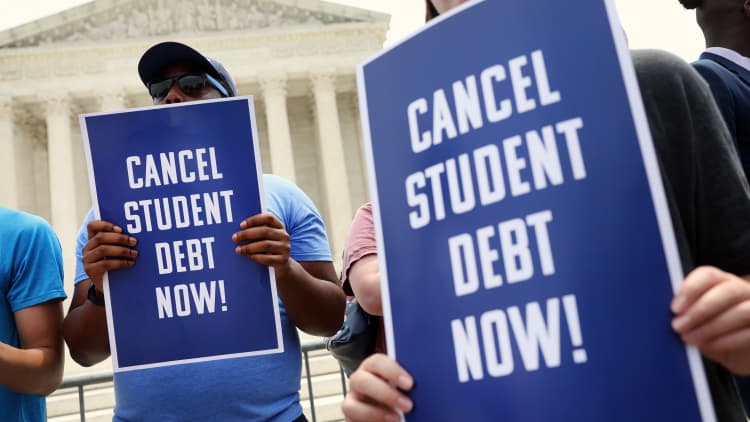It has been a frustrating and confusing time for many student loan borrowers.
President Joe Biden promised millions of Americans up to $20,000 in debt forgiveness, but then the Supreme Court blocked the program, and the relief never came. As payments restarted in October after a three-year break, borrowers were often given confusing or insufficient information on their accounts.
That has presented opportunities to scammers.
"When borrowers have difficulty reaching their loan servicers or are disappointed by the lack of loan forgiveness, they look elsewhere for help," said higher education expert Mark Kantrowitz. "Student loan scams fill the gap."
More from Personal Finance:
Can money buy happiness? 60% of adults say yes
The 'radically different' wage growth forecast in 2024
Cooling job market no reason for panic yet, economists say
Ari Lazarus, consumer education specialist at the Federal Trade Commission, wrote in a recent consumer alert that "scammers might try and tell you they can help you avoid repayment, lower your payments, or get your loans forgiven — for a price."
You should never pay someone over the phone offering these "services," experts say. At StudentAid.gov/repay, you can apply for different repayment plans, forgiveness programs and payment pause options for free.
"It isn't rocket science and takes just a few minutes," Kantrowitz said.
If a borrower is struggling to get through to their servicer, they can likely get their questions answered on the company's website or at StudentAid.gov, he added.
Student loan scam warning signs
If you're being pressured to pay an upfront fee to get help with your student loans, it is likely a scam, according to the Consumer Financial Protection Bureau. In many cases, these requests are illegal.
Promises for immediate student loan forgiveness are also likely scams, experts say. Although the government has programs that lead to debt cancellation, they take years to complete.
Communication about the Biden administration's new student loan forgiveness plan will come directly from the U.S. Department of Education and your student loan servicer. You can find the list of companies the government works with on student debt here.
If someone promises you that they can remove your debts from your credit report, it may also be a scam, the CFPB says. If you legally hold a debt, it will remain on your reports.
Scammers may also demand that you sign a "third-party authorization" or "power of attorney." These written agreements grant a person or company legal permission to talk directly to your student loan servicer and make decisions for you.
"Beware of any company that cuts off communication between you and your servicer," the CFPB says.

Some scammers may falsely claim to be affiliated with the Department of Education or your servicer. Borrowers should be extra careful that they're actually speaking to someone at their servicer and might want to ask to call their lender back directly if they're having doubts.
Meanwhile, emails with the Department of Education should have ".gov" in their addresses.
Borrowers should never give their FSA ID to anyone, the CFPB says. It notes that the government or your servicer will never ask for that information.
If you've been scammed or suspect someone of trying to scam you, StudentAid.gov has a list of different ways to report it.
Don't miss these stories from CNBC PRO:
- The S&P 500 is starting to form a 'cup and handle' pattern. How to watch for the potential breakout ahead
- Bank of America sees the S&P 500 rising to 5,000 next year, anticipates a 'stock picker's paradise'
- Morgan Stanley is bullish on this emerging AI trend — and names 6 stocks to play it
- These are Wall Street's favorite Warren Buffett stocks


